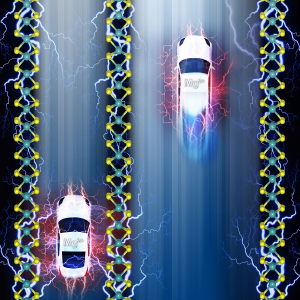Yan Yao, assistant professor in the Cullen College’s electrical and computer engineering department, is developing alternatives to popular lithium-ion batteries, which are used to power much of the modern world. Now, a recent breakthrough in this research has been published in the journals Nano Letters and ACS Applied Materials and Interfaces.
Yao’s batteries use magnesium ions instead of the traditional lithium ions, which are expensive and fraught with safety concerns. Lithium-ion batteries have a tendency to catch fire and even explode under certain conditions, especially when the batteries are used to power electric vehicles.
Magnesium ions are much safer and potentially much cheaper than lithium-based batteries. Magnesium is a resource abundant material, and due to its dendrite-free deposition behavior and capacity to discharge energy twice as much as that of lithium, magnesium-based batteries have many benefits over their lithium-ion counterparts.
However, magnesium ions also have drawbacks. Magnesium ions move extremely slowly in traditional host materials due to the strong interaction between the magnesium ions and the negatively charged host lattices inside of the batteries.
“In the Nano Letters paper, we demonstrated for the first time an interlayer expansion approach to transform an inactive host into efficient magnesium storage materials,” Yao said. The interlayer expansion was realized by inserting a thin layer of ionic conducting polymer into the layered materials’ lattice, which boosts magnesium’s diffusivity by two orders of magnitude.
The interlayer expansion approach could be leveraged to a wide range of host materials for the storage of various ions, leading to novel intercalation chemistry and new opportunities for the development of advanced materials for next-generation electric vehicles.
“In the paper published in ACS Applied Materials and Interfaces, we reported the other key advantage of magnesium-ion over lithium-ion batteries,” Yao said. “The dendrite-free deposition behavior of the magnesium-metal anode at high current density condition ensures safe operation, which is considered the ‘Holy Grail’ for ‘beyond lithium-ion’ technologies.”
Yanliang Liang and Hyun Deog Yoo, both postdoctoral research fellows in the electrical and computer engineering department, were first authors of the two papers. Graduate students Yifei Li and Jing Shuai were coauthors on the papers. The work published in Nano Letters was in collaboration with Lars Grabow, assistant professor of chemical and biomolecular engineering at the Cullen College, professor Hector Calderon of the School of Physics and Mathematics at the National Polytechnic Institute in Mexico City, Mexico, and associate professor Francisco Hernandez from the UH College of Technology.
The magnesium ion research was sponsored by the grant from the U.S. Navy’s Office of Naval Research Young Investigator Program (YIP) to develop safer and longer-lasting batteries for everything from electric vehicles to Navy vessels. In addition to research on magnesium-ion batteries, Yao and his team also work on aqueous-based batteries and sodium-ion batteries funded by the Advanced Research Projects Agency – Energy (ARPA-E) and the National Science Foundation (NSF), respectively.
For more information on these two publications, please click on the paper titles below:
Interlayer-Expanded Molybdenum Disulfide Nanocomposites for Electrochemical Magnesium Storage, Nano Lett., 2015, 15 (3), pp 2194–2202
High Areal Capacity Hybrid Magnesium–Lithium-Ion Battery with 99.9% Coulombic Efficiency for Large-Scale Energy Storage, ACS Appl. Mater. Interfaces, Article ASAP, DOI: 10.1021/acsami.5b01206
